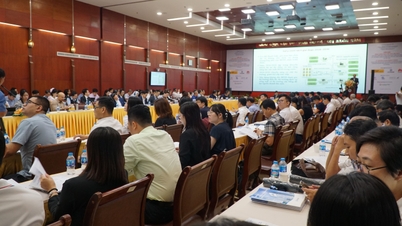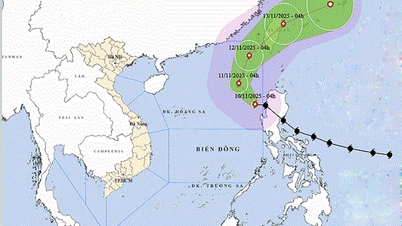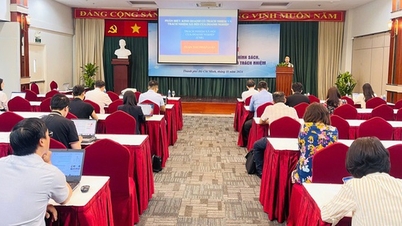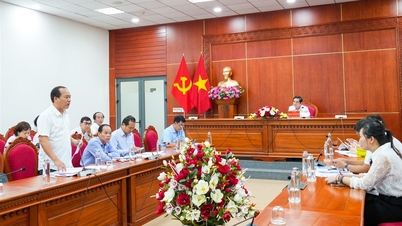Based on this list, the competent authorities will develop a detailed implementation plan for each platform and widely publicize it so that ministries, branches and localities can proactively prepare conditions for exploitation and use. The Ministry of Science and Technology emphasized that the formation of a shared digital platform system is not only of technical significance but also a breakthrough in the method of state management using technology, contributing to the creation of a synchronous, seamless and transparent national digital infrastructure framework.

Issue a list of 55 shared digital platforms for industries, fields and regions.
Of the 55 announced platforms, the Ministry of Public Security is in charge of 13 key platforms, focusing on security, identification and data safety. These are important systems such as the electronic identification and authentication platform, the national data portal, the cloud computing platform at the National Data Center, the data sharing and coordination platform, the email system serving state agencies, the asset auction management system, the data floor, the national blockchain platform, the national virtual assistant, the high-performance computing center, the shared data dictionary system, the new generation national SOC platform and the national cyber defense system. The Ministry of Public Security's responsibility for these platforms affirms the Government's priority focus on protecting data safety, ensuring network security and maintaining national digital sovereignty.
The Ministry of Finance is the managing unit of 10 platforms, focusing on public financial management and transparency. This list includes the national enterprise management platform, digital finance platform, data management and financial reporting platform of public administrative units, electronic tax platform, digital customs system, national single window portal, statistical data management platform, public state budget platform, public administrative accounting platform and national bidding network system. The synchronous operation of these platforms contributes to improving publicity and transparency in financial management, while supporting businesses and people to access services conveniently and effectively.
The Ministry of Home Affairs is assigned to manage five important platforms directly related to the State's human resource management, including the national platform for managing cadres, civil servants, and public employees; the electronic labor contract platform; the national job exchange; the labor and employment management platform; and the national digital storage platform.
The Ministry of Agriculture and Rural Development is responsible for five platforms related to agriculture and the environment, such as the national animal health and veterinary platform, the national geospatial data platform, the crop management and plant protection platform, the livestock, animal feed and animal disease management platform, and the animal disease surveillance and prevention platform in seven specialized regions of livestock and veterinary medicine.
The Government Office is the governing body of four macro-coordination platforms, including the National Public Service Portal, the Database Management System for monitoring tasks assigned by the Government and the Prime Minister, the Government Reporting Information System and the National Document Interconnection Axis. These are important platforms that help ensure that the Government's direction and administration are carried out smoothly and promptly, creating connections between the central and local levels.
The Ministry of Science and Technology, as the general coordinating agency, directly manages four platforms related to science, technology and innovation. These are the national data integration and sharing platform, the national digital platform for science, technology and innovation management, the national information system on science, technology and innovation, and the national electronic information portal. These will be tools to promote the development of the science - technology - innovation ecosystem, create data connections to serve policy making, research implementation and commercialization of science and technology products.
Many other ministries and sectors also participate in managing specific digital platforms. The Ministry of Foreign Affairs is responsible for the platform for managing international treaties and agreements and the shared consular platform; the Ministry of Justice manages the National Law Portal and the Vietnamese digital legal platform; the Ministry of Culture, Sports and Tourism is in charge of the national database platform on cultural heritage and the tourism management and business platform; the Government Inspectorate manages the platform for complaints and denunciations and the digital platform in inspection activities; the State Bank presides over the inter-bank electronic payment system and the national credit information system. In addition, the Ministry of Health, the Ministry of Education and Training, the Ministry of Industry and Trade, and the Ministry of Ethnic Minorities and Religions are also assigned to manage important platforms in the fields of health, education, trade and religion.
The clear assignment of governing bodies not only helps to define responsibilities but also facilitates synchronous and effective implementation. The governing bodies are responsible for developing detailed implementation plans, surveying business and user needs at the central and local levels, issuing regulations on features and functions, building platform architecture, organizing investment and operation, and widely publicizing to ensure that localities proactively prepare conditions for exploitation. During this process, the National Digital Transformation Agency under the Ministry of Science and Technology will play a role in guiding, urging and supervising the implementation.
The issuance of a list of 55 shared digital platforms is considered a strategic step, contributing to more clearly defining the national digital infrastructure. These platforms, when operated synchronously, will help state agencies exploit data effectively, reduce investment costs, and at the same time enhance transparency and management efficiency. People and businesses will directly benefit through access to high-quality online public services, convenience, time and cost savings./.
Source: https://mst.gov.vn/ban-hanh-danh-muc-55-nen-tang-so-dung-chung-tao-ha-tang-so-quoc-gia-thong-nhat-197251109212654429.htm























































































![Dong Nai OCOP transition: [Article 3] Linking tourism with OCOP product consumption](https://vphoto.vietnam.vn/thumb/402x226/vietnam/resource/IMAGE/2025/11/10/1762739199309_1324-2740-7_n-162543_981.jpeg)












Comment (0)